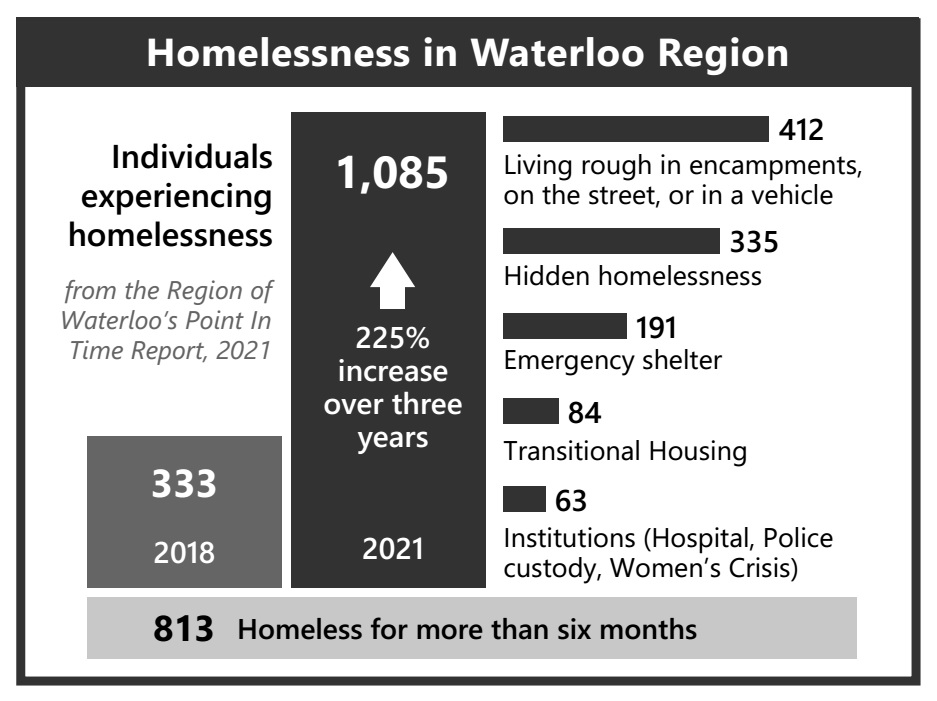By Joe Mancini
Published in December 2021
The numbers of homelessness continue to grow and they are reflective of the precarious circumstances that result from living with a low-income. The cost of rent has increased substantially over the years and now a one-bedroom is at minimum $1000 per month. Even those with money can barely find an apartment because the vacancy rate is so low. Those on a social income, those who are unsheltered cannot compete within the housing market. Their only hope is social housing or family. Furthermore, both social housing and shelters are stretched by the complex mental health and substance use issues that are prevalent in society.
This fall the Region of Waterloo put in place a focused plan to have a more complete picture of homelessness in Waterloo Region. This was done by engaging with those experiencing hidden homelessness as well as those in formal Housing Stability programs. This meant a comprehensive effort to survey those who were experiencing unsheltered homelessness and those living in encampments.
The chart below summarizes the findings.

Since 2017, we have seen a growing spike in homelessness. At The Working Centre we have seen this reality in more encampments, more people losing their housing, more people frustrated by the inability to get in from the cold. When we opened the warming centres in November 2019 at St. Mary’s Roman Catholic Church and the vacant Tim Hortons, it was because the numbers sleeping unsheltered were higher than they had ever been. We were not surprised when over 225 different people sought shelter at these sites.
Two years later, even with the 80 people at University Avenue Dorm housing, the 50 people at A Better Tent City and a further 70 motel rooms, there are still many without the ability to access shelter.
Here are just some recent examples from outreach workers:
-
A woman in a tent, unable to access shelters because of past violence, refusing mental health supports, keeping warm as the nights grow colder
-
A couple takes over someone’s supportive housing unit, offering money to help buy drugs, thus compelling the person to let them stay long after the money is spent
-
A dozen people huddle together under blankets outside UA, sharing body warmth in order to sleep
-
Person after person sneaks in to the dorms at UA and crash with a friend, who is only too happy to share their room
-
Campsites across the city, where outreach is asked to visit – people are connected to services but there are no solutions to find housing or shelter – and they are required to move on to a new place
-
A man running a propane heater so he and his dog stay warm in a storage unit as the days get colder
-
A mom and three adult sons all struggle to find housing, and are able to move out of their car as they share a temporary motel room
-
Tents, sleeping bags, socks, warm coats, boots – shared in constant supply to help people keep warm
The situations and stories are increasingly stark and harsh.
In our financial empowerment partnership with Prosper Canada and other organizations across Canada, we are seeing the precarious situations faced by many people who are not quite homeless but are just managing to hold things together. See the link to the Prosper Canada report for more details.
These numbers are reinforced by Waterloo Region Food Bank statistics. The Working Centre has distributed about 12% of the food distributed by Waterloo Region Food Bank who state that:
-
6,845,860 pounds of food was acquired, coordinated, and distributed to a network of 100+ community programs and agency partners in Waterloo Region
-
34,620 people in Waterloo Region had access to food when they needed it
The evidence is all around us, as we all pitch in to respond to this disturbing shift over the past five years. There is so much work to reconcile these shifting realities with our perception of Waterloo Region as a caring community that is equitable and looks after those most vulnerable.
Plans to Establish A Temporary Shelter at St. Andrew’s
We are grateful that St. Andrews will be partnering with The Working Centre as we host a temporary shelter this winter. They have acted to respond to the reality that there are not enough shelter spaces, resulting in too many people left out in the cold. With the help of the Region of Waterloo, this response is possible. It is hard, steady work, night after night providing supports in spite of the complexities while ensuring set up, garbage collection and cleaning, serving meals and snacks, listening and problem solving. We welcome community support as this temporary shelter gets off the ground.
Links:
Waterloo Region Point In Time Count (2021)
